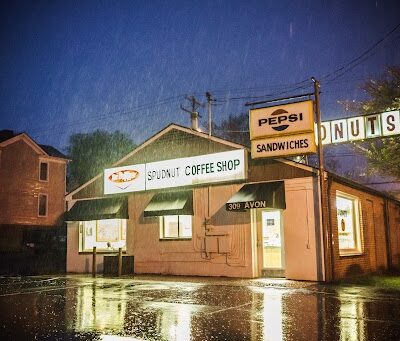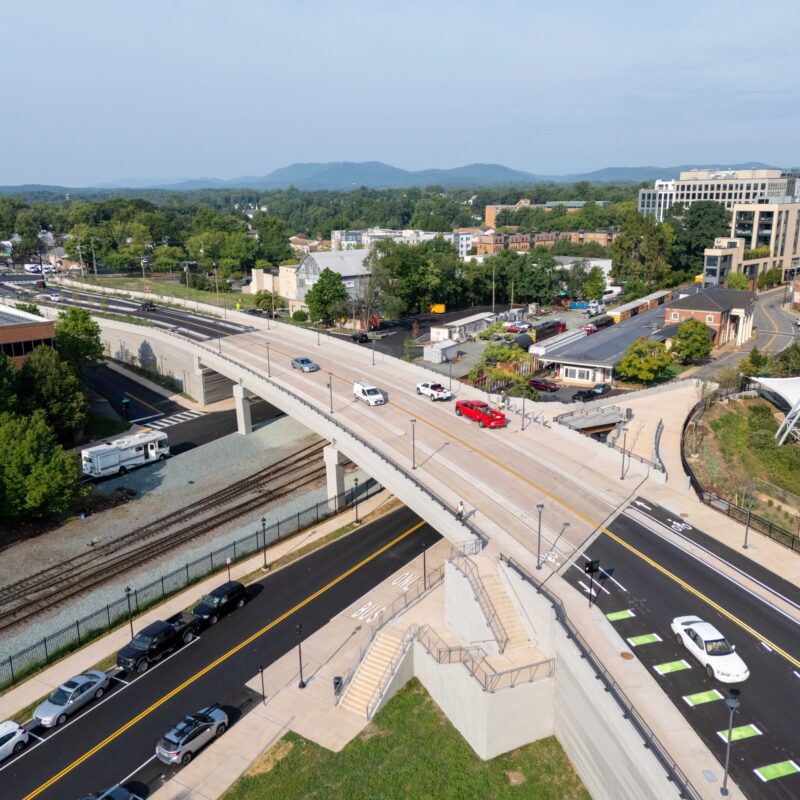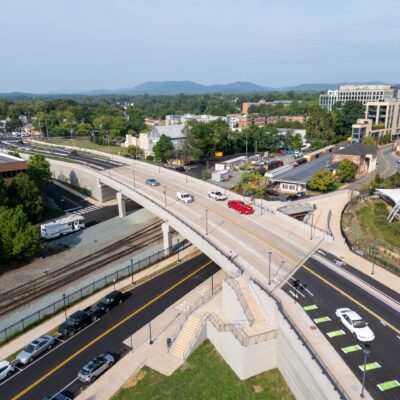After six hours of arguments and cross-examinations last Tuesday, Judge Jay Swett has yet to reach a decision in the latest Meadowcreek Parkway (MCP) lawsuit. Back in March, the judge denied an injunction filed by the Coalition to Preserve McIntire Park to immediately halt work on Albemarle County’s section of the MCP.
This time, in Charlottesville Circuit Court, the coalition (whose spokespeople include John Cruickshank, Rich Collins, Stratton Salidis and Peter Kleeman, among others) contended that the city has illegally granted the Virginia Department of Transportation (VDOT) a parcel of land for the MCP. The parcel in question was a softball field near Charlottesville High School that, according to the school’s athletic director, was left unused.
In June 2008, City Council voted 3-2 and granted construction easements for that parcel to VDOT; a deed was recorded this January. VDOT is also recorded as paying the city $43,210 for perpetual easement on the property. Because of the money stipulated in the deed, the coalition argues that the transfer was a sale obtained without a supermajority.
The coalition, represented by Jennifer McKeever, points to Article 7, Section 9 of the Virginia Constitution, which states local governments (in this case City Council) need a supermajority vote—or three-quarters—to transfer land to the state transportation agency.
The construction of the MCP has been under discussion for close to 40 years and its final design has been divided into three projects: a road in the county from Rio to Melbourne roads, called Meadowcreek Parkway; a city portion planned through McIntire Park, called McIntire Extended; and the final portion, called the 250 Interchange. “This is just the first round,” Cruickshank told C-VILLE. “We really have a stronger case on the federal laws.”
In fact, federal law requires that public projects that are federally funded and that include public parks in their plans must endure an environmental review process and impact studies. In addition, Cruickshank says that the National Environmental Protection Act (NEPA) should be applied to the entire MCP, and not to single portions. He argues that McIntire Extended and the 250 Interchange should be viewed as one project.
“It absolutely is one project; this connects right to it,” he says. McIntire Extended is state-funded, while the 250 Interchange is paid for with federal money. “They are segmenting this project to evade the environmental laws that protect historic sites and parklands,” says Cruickshank.
City Attorney Craig Brown, part of the defense along with Virginia’s Assistant Attorney General Lori Pound representing VDOT, argued that the city did not violate the constitution and that there was no ground to grant the plaintiffs legal standing.
Pound, echoing Brown’s standing assertion, argued that the only people who could have been granted standing were the two city councilors who voted against the project—Mayor Dave Norris, who took the stand, and Holly Edwards—and the one member of the school board who voted against the transfer of land. “I think that people who represent neighborhood associations, environmental groups, people who are property owners in the area certainly have standing,” says Cruickshank.
Pound argued that the injuries the plaintiffs claim they will be suffering from the construction of the Parkway are not “particularly different from those of the general public.” These damages include loss of public land, decrease in property values and significant increase of cut-through traffic, pollution and noise, in addition to access to that parcel.
Pound added that VDOT would be financially harmed by an imminent halt to the construction. During the hearing in March, VDOT officials testified that if the construction were to be halted immediately, it would cost the department about $20,000 a day. Even if Judge Swett sides with the coalition, VDOT would not be able to promptly stop construction. VDOT contends that if it did stop, materials that would be left onsite would be worth approximately $400,000.
If Judge Swett sides with the defense, Cruickshank is poised to continue the fight. “We will press on, and we will protect the park,” he says. Meanwhile, Faulconer Construction began work on the county portion of the MCP in February.
C-VILLE welcomes news tips from readers. Send them to news@c-ville.com.





